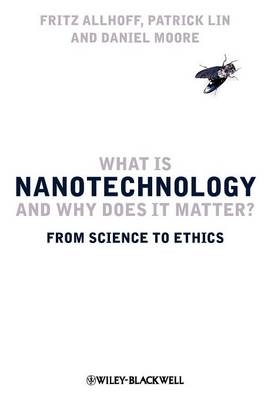
What Is Nanotechnology and Why Does It Matter?
Wiley-Blackwell (an imprint of John Wiley & Sons Ltd) (Verlag)
978-1-4051-7545-6 (ISBN)
- Titel ist leider vergriffen;
keine Neuauflage - Artikel merken
Ongoing research in nanotechnology promises both innovations and risks, potentially and profoundly changing the world. This book helps to promote a balanced understanding of this important emerging technology, offering an informed and impartial look at the technology, its science, and its social impact and ethics. * Nanotechnology is crucial for the next generation of industries, financial markets, research labs, and our everyday lives; this book provides an informed and balanced look at nanotechnology and its social impact * Offers a comprehensive background discussion on nanotechnology itself, including its history, its science, and its tools, creating a clear understanding of the technology needed to evaluate ethics and social issues * Authored by a nanoscientist and philosophers, offers an accurate and accessible look at the science while providing an ideal text for ethics and philosophy courses * Explores the most immediate and urgent areas of social impact of nanotechnology
Fritz Allhoff is Assistant Professor in the Department of Philosophy at Western Michigan University, where he also holds an affiliation with the Mallinson Institute for Science Education. He has held fellowships at the Center for Philosophy of Science at the University of Pittsburgh and the Centre for Applied Philosophy and Public Ethics at the Australian National University. He has edited more than 20 books, including two on the social and ethical implications of nanotechnology. Patrick Lin is the director of Ethics + Emerging Sciences Group at California Polytechnic State University, San Luis Obispo, and holds academic appointments at Dartmouth College, US Naval Academy and Western Michigan University. He is also lead author of a recent major report funded by the Department of Navy entitled Autonomous Military Robotics: Risk, Ethics, and Design (2008), as well as other publications in technology ethics, including edited anthologies on nanoethics. Daniel Moore is a research scientist on nanoscale semiconductor solutions for IBM. He served on the Georgia Institute of Technology s honor committee and has received numerous fellowships, including the Molecular Design Institute Fellowship, the GT Nanoscience and Technology Fellowship, the School of Materials Science and Engineering Advanced Publication Award, the NSF STEP Fellowship, and a Sam Nunn Security Fellowship. His professional experience includes nanoscale research in other leading industry laboratories.
Preface viii Unit I What Is Nanotechnology? 1 1 The Basics of Nanotechnology 3 1.1 Definitions and Scales 3 1.2 The Origins of Nanotechnology 5 1.3 The Current State of Nanotechnology 8 1.4 The Future of Nanotechnology 12 1.5 Nanotechnology in Nature and Applications 16 2 Tools of the Trade 20 2.1 Seeing the Nanoscale 21 2.2 Basic Governing Theories 30 3 Nanomaterials 36 3.1 Formation of Materials 36 3.2 Carbon Nanomaterials 37 3.3 Inorganic Nanomaterials 44 4 Applied Nanotechnology 56 4.1 Using Nanomaterials 56 4.2 Nanotechnology Computing and Robotics 62 4.3 Predicting the Future of Technology 67 Unit II Risk, Regulation, and Fairness 71 5 Risk and Precaution 73 5.1 Risk 73 5.2 Cost Benefit Analysis 79 5.3 Precautionary Principles 82 5.4 Evaluating the Precautionary Principle 89 6 Regulating Nanotechnology 96 6.1 The Stricter-Law Argument 97 6.2 Learning from History 100 6.3 Objections to the Stricter-Law Argument 102 6.4 An Interim Solution? 120 6.5 Putting the Pieces Together 124 7 Equity and Access 126 7.1 Distributive Justice 127 7.2 Nanotechnology and the Developing World 132 7.3 Water Purification 135 7.4 Solar Energy 140 7.5 Medicine 143 7.6 Nanotechnology, the Developing World, and Distributive Justice 145 Unit III Ethical and Social Implications 151 8 Environment 153 8.1 Society, Technology, and the Environment 154 8.2 Environmental Risks of Nanotechnology 159 8.3 Nanotechnology Solutions to Environmental Problems 161 8.4 Overall Assessments: Risk and Precaution 168 9 Military 170 9.1 The Military and Technology 170 9.2 A Nano-Enabled Military 173 9.3 A Nano-Enabled Defense System 177 9.4 Ethical Concerns 179 10 Privacy 185 10.1 Historical and Legal Background 186 10.2 Philosophical Foundations 192 10.3 Radio Frequency Identity Chips 198 10.4 Item-Level Tagging 201 10.5 Human Implants 204 10.6 RFID-Chipped Identification 207 10.7 Is RFID a Threat to Privacy? 210 11 Medicine 215 11.1 The Rise of Nanomedicine 216 11.2 Diagnostics and Medical Records 219 11.3 Treatment 223 11.4 Moving Forward 227 12 Human Enhancement 230 12.1 What is Human Enhancement? 231 12.2 Defining Human Enhancement 234 12.3 The Therapy Enhancement Distinction 237 12.4 Human Enhancement Scenarios 240 12.5 Untangling the Issues in Human Enhancement 243 12.6 Restricting Human Enhancement Technologies? 252 13 Conclusion 254 13.1 Chapter Summaries 255 13.2 Final Thoughts and Future Investigations 258 References 261 Index 282
| Erscheint lt. Verlag | 28.1.2010 |
|---|---|
| Verlagsort | Chichester |
| Sprache | englisch |
| Maße | 166 x 242 mm |
| Gewicht | 690 g |
| Themenwelt | Naturwissenschaften |
| Sozialwissenschaften ► Soziologie | |
| Technik | |
| ISBN-10 | 1-4051-7545-1 / 1405175451 |
| ISBN-13 | 978-1-4051-7545-6 / 9781405175456 |
| Zustand | Neuware |
| Haben Sie eine Frage zum Produkt? |
aus dem Bereich


